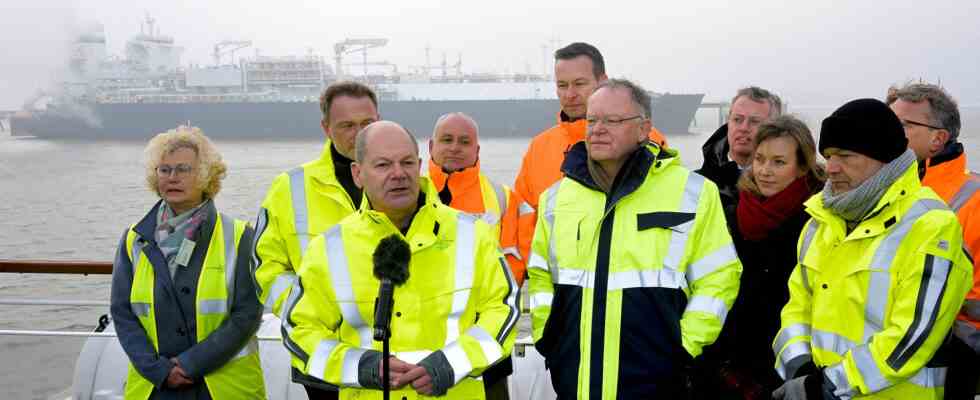Status: 12/17/2022 1:05 p.m
Chancellor Scholz has opened Germany’s first liquefied natural gas terminal in Wilhelmshaven. He praised the construction in a record time of ten months. The LNG terminal is a “very important contribution to our security”.
Ceremony in Wilhelmshaven: Federal Chancellor Olaf Scholz officially opened the first German liquefied natural gas terminal in Wilhelmshaven, Lower Saxony. With these and the other LNG terminals, the German energy supply will be “independent of the pipelines from Russia,” said Scholz in his speech on the special ship “Höegh Esperanza”. The terminal is a “very, very important contribution to our security”.
Around six percent of Germany’s natural gas requirements are to be fed into the grid via the terminal each year. The so-called Floating Storage and Regasification Unit (FSRU) accepts liquefied natural gas (LNG) from tankers and converts it into gas on board. According to the group, gas is to be fed into the German pipeline network from Thursday.
“There is a very large protest happening”, Sebastian Duden, NDR, from the ceremony for the opening of the LNG terminal in Wilhelmshaven
tagesschau24 11:00 a.m., 17.12.2022
Praise for the new “Germany pace”
At the opening, Scholz praised the rapid availability of the facilities, which had hardly been thought possible just a few months ago. “This is now the new pace in Germany, with which we are advancing infrastructure,” said the Chancellor. In this respect, this is also a sign of the strength of the German economy. “By the end of next year we are expected to have an import capacity of over 30 billion cubic meters of gas.”
The Chancellor referred to the dramatic consequences of Russia’s war of aggression against Ukraine – primarily for the Ukrainians, but also for inflation and energy security. If, after this terminal, the other planned facilities in Lubmin, Brunsbüttel and Stade are also completed, “then we can say: Germany has guaranteed its energy security,” emphasized the Chancellor. In this respect, this is “a good day”.
Economics Minister Robert Habeck, Finance Minister Christian Lindner and Lower Saxony’s Prime Minister Stephan Weil also attended the opening.
Long-term supply contracts
Shortly before the inauguration, Scholz and the Norwegian company Höegh assured that they would quickly take care of the expansion of the liquid gas connections. “Our goal is to completely compensate for the loss of Russian gas in the coming year,” Scholz told the Süddeutsche Zeitung. You can also get through the next winter.
The federal government is in constant contact with the gas importers and is also promoting the conclusion of long-term contracts. “As a lesson from the past, we must make ourselves less dependent on individual suppliers in the future,” warned Scholz. Most of the gas will come from Norway, the US and the Gulf, with a small portion from the Netherlands.
The Federation of German Industries (BDI) had warned against excessive euphoria. The risk of a gas shortage has not yet been averted with the new terminal.
Habeck: Emergency defense has absolute priority
Economics Minister Robert Habeck had in an interview with the daily topics defended its energy policy. “Averting the emergency has absolute political priority,” he said in relation to a possible gas shortage. The government had “decided wisely, reacted decisively and managed to do something that was rightly considered impossible in the middle of the year.”
“Half of the gas is missing and has to be brought to Germany via other infrastructures,” said Robert Habeck, Federal Minister of Economics
daily topics 10:15 p.m., 16.12.2022
The Economics Minister therefore rejected the accusation by climate protectionists that Germany is creating overcapacity for gas and is blocking the way to the climate goals. “There can be no talk of overcapacity,” Habeck contradicted daily topicsinterview and pointed out that the terminals only ensure a third of German consumption.
Environmental aid announces legal action
The German Environmental Aid (DUH) announced further legal steps to achieve a time limit on the operation. A first lawsuit is already pending. “The climate crisis and the energy crisis must not be played off against each other,” said DUH federal director Sascha Müller-Kraenner. He fears that the targeted reduction in emissions of climate-damaging gases will be jeopardized by excessive imports of liquefied natural gas.
Last but not least, the introduction of large quantities of biocide was permitted, but that should be prohibited. The DUH will “enforce all of this with legal means if necessary,” the organization said. Habeck was confident that the approval for the terminals would withstand lawsuits.

